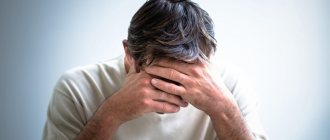Now I am the most unhappy person alive. If what I feel is distributed evenly among all representatives of humanity, then there will not be a single joyful face left on the entire earth. I don't know if I'll ever get better, I'm terrified that this might not happen. It is impossible to live in the state I am in now. I must either die or get better.
Abraham Lincoln
Every person experiences grief and moments of sadness from time to time. And this is a normal reaction to disappointments, life difficulties and failures. Many people use the word "depression" to describe these types of feelings and reactions, but depression is much more than just feeling sad and depressed.
Causes and risk factors for depression
Depression is not just an imbalance of chemicals in the brain. Depression is caused by a combination of biological, psychological and social factors. In other words, your lifestyle, relationships, and how you deal with life's challenges have just as much, if not more, influence on depression than genetics. However, some risk factors make a person more vulnerable.
These include loneliness, lack of social support, recent stressful events, depression in family members, family or relationship problems, financial distress, childhood trauma or abuse, alcohol or drug abuse, unemployment and unqualified work, health problems or chronic pain.
Express test:
Examine your stress levels
Depression: causes
The causes of depression can be divided into two groups: physiological – a consequence of a disorder in the production of neurotransmitters (serotonin and norepinephrine) and psychological – a consequence of psychological trauma and experiences.
Psychological causes of depression:
- Psychotraumatic situations - violence, disasters, death of loved ones. As practice shows, this type of depression lasts from one to two months and is interpreted as an adaptation reaction, but often without professional help it can cause prolonged depression.
- Regularly experiencing stressful situations - an accumulating “lump” of troubles can cause depression. This is a constant misunderstanding of loved ones, poverty, alcohol abuse, chronic diseases. The goal of treatment in this case is not only to get rid of pathological symptoms and normalize the condition, but also to “work through” with a psychologist the cause of the depressive state (a change in attitude towards the situation - the cause, if it cannot be eliminated).
- Old psychological trauma - usually all the stressful situations that we experience in childhood are blocked by our nervous system, but they can emerge in adulthood. As a result, phobias, increased anxiety, panic attacks, obsessive thoughts, depressive states, etc. may occur. Work with the patient is also aimed at identifying and overcoming the psychological trauma experienced previously.
- Frustration is the reason for an impossible desire - when you really want it, but it is impossible to get it. Psychotherapy is aimed at utilization of needs or achievement.
- An existential crisis is a complete loss of harmony, life goals, and lack of meaning in life. It is often observed at the age of 40-50, when a person takes stock of his life. The patient needs long-term psychological therapy.
- A pessimistic outlook on life - in any action, in any situation, a person looks only for the bad, setting himself up for negative consequences. The condition can be corrected with the help of a psychologist, psychotherapist and... the desire of the person himself.
Physiological causes of depression:
Impaired functioning of the neurotransmitter systems (serotonergic and noradrenergic) - in this case, depression manifests itself for no specific reason.
- Overwork, chronic fatigue.
- Intoxication with medications, narcotic substances or excessive alcohol consumption.
- Brain injuries.
- Previous strokes.
- Diseases associated with hormonal imbalance (hypothyroidism, menopause, etc.).
- Presence of chronic diseases.
- Impaired functioning of the neurotransmitter systems (serotonergic and noradrenergic) - in this case, depression manifests itself for no specific reason.
Practice shows that depression is usually caused by several factors. An experienced doctor must determine the full range of causes and prescribe comprehensive and effective therapy. The result of treatment depends on this.
How depression manifests itself
Some patients who actually suffer from depression describe the condition as a feeling of impending danger and imminent grief. When emptiness and despair do not go away and fill your entire life, it can be depression. The words of Abraham Lincoln, who suffered from depression and struggled with it all his life, very well and deeply convey the essence of this condition.
When you are depressed, it is very difficult to live, be happy and enjoy normal life as others do. However, some people with depression do not feel sadness at all, but feel emptiness, apathy, lifelessness, and the meaninglessness of their existence. Others may feel angry, aggressive and anxious.
Regardless of how depression manifests itself, the condition affects a person's ability to work, study, eat, sleep, and have fun. There is a pronounced feeling of helplessness, despair, and the futility of any attempts to change or do anything.
Inability to sleep or, conversely, increased sleepiness, difficulty concentrating, difficulty solving and completing tasks that were previously easy, feelings of hopelessness and helplessness, inability to control negative thoughts, loss of appetite, impaired perception of time, lack of satisfaction from food and sleep - This is what a standard list of depression symptoms looks like. With it, a tendency to abuse alcohol, irritability, aggressiveness, and thoughts that life is not worth living may increase. The latter is especially dangerous.
According to WHO, about 4-5% of the world's population suffers from depression. 15% of patients commit suicide, which is approximately 60% of all suicide attempts. The mortality rate for depressive disorder is only slightly lower than that for cardiovascular disease.
Depression is a major risk factor for suicidal behavior. A deep sense of despair, hopelessness and helplessness can lead to the fact that suicide seems to be the only way out, the only way to end suffering and stop feeling unbearable mental pain. Thoughts of death and suicide are serious symptoms of depression. If you suspect that someone in your family of friends is thinking this way, you need to take action immediately and seek help because help is possible and exists.
Some useful phone numbers:
1. Moscow psychological assistance service 051 (free, 24 hours a day)
2. “Helpline” for emergency psychological assistance
(495) 575-87-70
3. Hotline numbers of the Center for Emergency Psychological Assistance of the Ministry of Emergency Situations of Russia:
in Moscow, in St. Petersburg: (812) 718-25-16
PsyAndNeuro.ru
Depression is projected to be the largest contributor to the burden of disease by 2030, with a prevalence of approximately 20% and a relapse rate of 75%. Additionally, even with pharmacotherapy, only about 30% of adults with depression achieve remission. The National Academy of Medicine has called for the active development, evaluation, and implementation of prevention strategies focused on depression [1]. At the same time, to create such a strategy, it is first necessary to identify the biobehavioral factors that carry the greatest risk.
Sleep disorders (i.e. insomnia) occur in approximately 15% of the population, with up to 70% in patients seeking non-specialized medical care [2]. Among patients with depression, sleep disturbances are one of the most common complaints and often persist as a potential predictor of relapse of depression [2]. Because the use of antidepressants does not reduce this risk [3], interventions that target sleep disturbances are necessary to prevent relapse of depression [3].
However, not all people with sleep problems develop an episode of depression, raising the possibility that other factors along with insomnia contribute to clinically important depressive symptoms. Moreover, it is unknown how exactly insomnia becomes a biological and affective risk factor for depression, which is critical for identifying molecular targets of pharmacological interventions and improving treatments for insomnia that target the affective response.
Real-world empirical, prospective, and experimental evidence shows that sleep disturbances are associated with increased plasma concentrations of systemic markers of inflammation, such as C-reactive protein and interleukin-6 [4], which have been found to be predictors of depression. Likewise, significant fluctuations in sleep duration, such as sleeping less than 6 hours or more than 8 hours per night, lead to increased levels of systemic inflammation4. Moreover, sleep disruption has been experimentally found to induce activation of biological inflammation at various levels, including increased systemic inflammation; monocyte production of pro-inflammatory cytokines; activation of nuclear factor (NF)-κB transcription, which controls the pathological signal transducer and transcription activator pathway; transcription of interleukin-6 and tumor necrosis factor mRNA; and expression of pro-inflammatory transcriptomes. Interestingly, this immune activation in response to sleep disturbances is strongest in young people, and in women compared to men, consistent with epidemiological evidence showing that young women have the greatest risk of depression.
Given that inflammation can cause profound behavioral changes that include the emergence of depressive symptoms such as low mood, anhedonia, fatigue, psychomotor inhibition and socio-behavioral withdrawal [5,7,8], the inflammatory biotype under the influence of sleep disturbances may be a key phenomenon driving the pathogenesis of depression and relapse. Moreover, sleep disorders and depression overlap with severe medical diseases that have an inflammatory basis, such as asthma, rheumatoid arthritis and cardiovascular diseases.
Inflammation is not static, but rather exhibits dynamic variability, due in part to many contributing factors, including specific disease conditions (ie, infections) and psychosocial factors (ie, interpersonal stress). Such acute increases in inflammatory activity may explain the prospective association between these multilevel processes and the subsequent episode of depression.
For example, in controlled experimental models that mimic the effects of infections, inflammatory activation induces an increase in depressive mood, which correlates with activation of brain regions that play a role in the pathophysiology of major depressive disorder, and with a decrease in reward or anhedonia processing, which correlates with a decrease in activity of the ventral striatum. [5].
In addition, such experimental strategies support the “two-hit” model of depression, in which sleep disturbances act as a vulnerable contributor to increased severity of depressive symptoms following exposure to inflammatory symptoms,6 and clinical considerations suggest that the risk of depression is increased when sleep disturbances co-occur with inflammation. such as infection or psychosocial stress. Conversely, there is evidence that inflammation itself may act as a vulnerability factor and increase the risk of depression when a person with an inflammatory biotype experiences sleep disturbances.
If insomnia is associated with inflammation and depression, and if inflammation in turn predicts depressive symptomatology, the hypothesis that treating sleep disorders may improve inflammation and reduce the risk of depression is compelling. Prospective evidence supports this possibility.
Among the various treatment options for insomnia, cognitive behavioral therapy for insomnia (CBT-I) is recognized as the gold standard, with effects that are consistent and longer lasting than pharmacological therapy. In randomized controlled trials, CBT-I shows a significant positive effect on insomnia outcomes, which are also associated with long-term (i.e. one year) and large (>50%) reductions in C-reactive protein levels, as well as a reduction in the proportion of patients with insomnia patients whose C-reactive protein levels reach levels associated with high risk (>3.0 mg/dl) [6]. Importantly, these improvements in insomnia and inflammation coincided with reductions in depressive symptoms.
In addition, mind-body interventions such as tai chi (i.e., movement meditation) and clear-mind meditation, which are known to influence stress response mechanisms, have been found to be as effective as CBT-I in treating insomnia9. and also help normalize the function of the insomnia-associated inflammatory leukocyte transcriptional profile (i.e., genes regulated by pro-inflammatory factors of the NF-κB/Rel group) and deactivate cellular inflammation, with a greater effect than with CBT-I treatment.
While antagonists of endogenous inflammation appear to reduce depressive symptoms, at least in those patients with depression for whom the inflammatory subtype of the disease has been demonstrated, such treatment is expensive and carries risks of side effects that are not observed. in psychotherapeutic interventions, making these interventions optimal for community-wide scaling to improve insomnia outcomes and reduce inflammation, as well as potentially prevent depression.
Insomnia and inflammation deliver a concerted double whammy, creating a population particularly vulnerable to the onset and/or relapse of depression. Treatments that target the inflammatory biotype and/or insomnia-promoting behavioral phenotype are promising strategies for preventing the onset of depression.
Translation into Russian was organized by the Council of Young Scientists of the Russian Society of Psychiatrists with the support of the World Psychiatric Association.
Author of the translation: Proskurina D.S.
Editor: Ph.D. Potanin S.S.
Home article
Sources:
- Institute for Medicine. Preventing mental, emotional, and behavioral disorders among young people: progress and possibilities. Washington: National Academy Press, 2009.
- Irwin MR. Annu Rev Psychol 2015;66:143-72.
- Cho HJ, Lavretsky H, Olmstead R et al. Am J Psychiatry 2008;165:1543-50.
- Irwin MR, Olmstead R, Carroll JE. Biol Psychiatry 2016;80:40-52.
- Slavich GM, Irwin MR. Psychol Bull 2014;140:774-815.
- Irwin MR, Opp MR. Neuropsychopharmacology 2017;42:129-55.
- Dantzer R Biol Psychiatry 2012;71:4-5.
- Irwin MR, Cole SW. Nature Rev Immunol 2011;11:625-32.
- Irwin MR, Olmstead R, Carrillo C et al. J Clin Oncol 2017;35:2656-65.
Masks of depression
Depression can occur differently in men, women, young people and older people, and these characteristics must be recognized.
Depression in men
Men often complain of fatigue, irritability, sleep disturbances, loss of interest in work and hobbies. In addition, their depression may manifest itself as anger, aggression, violence, restless behavior, or alcohol or substance abuse. Despite the fact that depression is twice as common among women, men have a higher risk of suicide than the fairer sex.
Depression in women
The increased incidence of depression among women is partly due to hormonal factors: severe premenstrual syndrome, the postpartum period, and menopause.
Women, more often than men, experience a conscious feeling of guilt, increased sleepiness, suffer from overeating and, as a result, problems with excess weight. Seasonal affective disorder is also more common in women.
Depression in teenagers
The dominant symptom in adolescence is irritability. A depressed teenager can be aggressive, sullen, and unrestrained. For some teenagers, depression manifests itself as a feeling of sadness, while for others it does not. Symptoms often include unexplained pain or discomfort.
Depression in older people
Depression is not a normal or natural part of aging. But some life situations that older people more often face (loss of loved ones, loss of independence and independence, health problems) can lead to depressive disorder.
Older people tend to complain about physical rather than emotional symptoms of depression, and therefore the problem often goes unnoticed. Depression in older adults is associated with fragile health, high mortality rates, and an increased risk of suicide, so prompt diagnosis and treatment are essential.
Postpartum depression
Many new mothers suffer from a short-term form of “postpartum sadness” or “postpartum blues.” Postpartum depression is a long-term and more serious condition that is partly caused by hormonal changes during pregnancy and the period after childbirth. The prevalence of this disorder averages about 13% of all mothers in the postpartum period. It usually occurs soon after childbirth, but any depression identified within 6 months after childbirth may be postpartum.
What to do if insomnia is associated with depression?
Obviously, if sleep disturbances are caused by depression, then it is necessary to deal with the problem by eliminating the causes of insomnia. However, there are a few basic sleep hygiene rules that are worth trying before visiting a specialist.
- Go to bed and get up at the same time, both on weekdays and on weekends.
- Don't overeat before bed—dinner should be light.
- Exercise only in the morning and afternoon. In the evening, it is better to take a leisurely walk in the fresh air.
- In the afternoon, reduce your consumption of tea, coffee and alcohol, and ideally, give up these drinks.
- Make sure your bed and pillows are comfortable. And don’t forget that a bed is a place for sleeping, not for watching TV, eating or while away your free time.
- Ventilate the room and dim the lights before going to bed.
Undoubtedly, insomnia caused by depression requires proper treatment. Therefore, do not be afraid of contacting a specialist - a psychotherapist. Doctors have many ways at their disposal to effectively correct disorders and normalize the quality of sleep and life. Depending on the severity of depression and sleep disorders, a specialist may recommend:
- rational, behavioral and cognitive psychotherapy;
- auto-training aimed at increasing self-esteem;
- biofeedback techniques;
- relaxation techniques;
- sleep deprivation - deliberate refusal to sleep for 36 hours or more.
In addition to psychotherapeutic techniques, the doctor may resort to medications to normalize sleep. At one time, the most commonly prescribed sleeping pills were barbiturates, benzodiazepines, and imidazopyridines. But their side effects: addiction, dependence and the need to increase the dose, led to the search for new effective and safe sleeping pills.
The search was crowned with success when the hypnotic (sleeping) properties of H1-histamine receptor blockers were discovered. Medicines in this group reduce the time it takes to fall asleep, increase the duration and quality of sleep, do not disrupt the structure and phases of sleep, and most importantly, do not have the side effects that make it necessary to abandon “classical” sleeping pills.
Chronic insomnia associated with depression is not the most pleasant type of sleep disorder and seriously impairs the quality of life. However, timely contact with a specialist and a significant arsenal of psychotherapeutic methods and modern medications are the only sure way to solve the problem. Don't be shy to ask for help. Believe me, everything can be fixed and good sleep will definitely return to you!
Depression as a symptom of other diseases
Depression as a syndrome occurs in the structure of a number of diseases: depressive disorder itself or a depressive episode, bipolar affective disorder, seasonal affective disorder, dysthymia. All this will be described in more detail below.
Major depressive disorder (clinical depression)
Major depressive disorder is characterized by the inability to enjoy life and experience pleasure.
Symptoms:
- a noticeable decrease in interests or loss of satisfaction usually obtained from enjoyable activities;
- decrease in habitual emotional response to events or activities;
- early awakening (2 hours or more before the usual time);
- daily mood fluctuations;
- obvious loss of appetite;
- weight loss;
- a distinct decrease in sexual desire.
These symptoms are constant and vary from moderate to severe. Some people have only one depressive episode in their lifetime, but recurrent episodes are most common.
Bipolar disorder
Bipolar disorder is characterized by cyclical mood swings. Episodes of depression are followed by episodes of mania, which may include impulsive behavior, hyperactivity, rapid speech, shortened sleep, or no sleep at all. Although patients with bipolar disorder experience depressive phases exactly like the depressive disorder described above, the treatment is different.
Seasonal affective disorder
This type of depression occurs in 1-2% of people in the population, more often in women and young people. It is believed that the onset of seasonal affective disorder is associated with insufficient exposure to sunlight. It usually occurs in autumn or winter and goes away with the onset of spring. Sometimes it is enough for such patients to simply go on vacation to southern countries in the autumn.
Dysthymia
This is a chronic mild depressive state. Most of the time the patient feels slightly or moderately depressed, but there may be short periods of normal mood, no more than a few weeks. The severity of depressive symptoms in dysthymia is much less than in major depressive disorder, but they last a very long time (at least 2 years).
This chronic condition does not allow you to fully enjoy life and remember its best and most pleasant moments. With dysthymia, patients often feel as if they are constantly depressed. Sometimes the patient begins to think that he is just such a person - always in no mood. However, dysthymia can be treated with good effect, even if the symptoms are very long-lasting.
Types of insomnia
Insomnia (insomnia) refers to various sleep disorders. Among them:
- problems falling asleep;
- feeling of insufficient depth of sleep;
- frequent awakenings, after which it is difficult to fall asleep;
- post-somnia disorders (characterized by excessively early awakening).
Please note: There is an opinion that we can already talk about sleep disorders if for several days in a row a person cannot fall asleep 15-20 minutes after going to bed.
Treatment of depression
Knowing the causes of depression helps determine treatment tactics. If the reason is loneliness, then communicating with new people and making new friends will have a better effect on your mood than antidepressants. If depression is caused by a job that you don’t like, then changing the situation (changing jobs) will help the person more than going to a psychotherapist.
In addition, there are some universal tips that are useful in many cases.
Ask for help. Feelings of hopelessness are symptoms of depression that often prevent a person from seeking help; we need to try to overcome this.
Communicate. Good support can speed up your recovery. Isolation contributes to depression, so connect with people even if you want to be alone.
Lead a healthy lifestyle. It's not easy to do, but making lifestyle changes can have a major impact on you, your life in general, and your depression. Exercise regularly and get enough sleep for you. Review your diet - your diet should be healthy and correct.
Develop skills in managing and mastering emotions. Many people lack the skills to manage emotions, manage stress, and gain emotional balance. Developing emotion management skills can give you the ability to cope and adapt after loss, trauma, and adversity. In other words, by learning how to recognize and express emotions, you will become more psychologically and mentally resilient.
If support from family and friends, positive thinking, and developing emotional management skills are not enough, seek professional help.
There are many effective treatments for depression, including psychotherapy, medication, and sometimes alternative medicine.
Express test:
Take a comprehensive sleep test
Symptoms of insomnia
Insomnia is easily recognized by the patient’s appearance. Characterized by redness of the eyes, pale skin, swelling (“bags”) under the eyes, dry lips and lethargy. A person suffering from insomnia, in most cases, is constantly in a depressed mood.
Symptoms of insomnia are:
- inability to fall asleep for a long time (up to several hours);
- complete or partial lack of sleep at night;
- sleep of insufficient depth, which does not give a feeling of rest;
- Frequent or early awakenings, after which it is difficult to fall asleep again.
Important: Frequent lack of sleep is unsafe. Insomnia leads to disruptions in the functioning of the central nervous system. A person’s performance decreases, irritability increases, and depression can often develop. Regular sleep disturbances increase the risk of early mortality.
Do you need to take antidepressants
Pharmacotherapy helps some people relieve or alleviate the symptoms of depression, but complete cure with medication is often not achieved. In addition, the drugs have a number of side effects. Knowing the mechanism of action and side effects of antidepressants will help you make your own informed decision about whether these drugs are right for you as a treatment for depression.
Effective treatment for depression often includes some form of psychotherapy. Psychotherapy allows you to look at and study depression from different angles. In addition, what you learn during therapy gives you mindfulness skills and a deep understanding of the situation, which prevents depression from returning.
Some types of psychotherapy focus on teaching the patient a set of specific practical techniques or how to reframe negative thoughts and use behavioral skills to combat depression. Sometimes simply connecting with a professional who understands you is enough to change your condition for the better. Psychotherapy helps you work with the root cause or causes of your depression, helping you understand why you feel a certain way and what you can do or have done to stay healthy.








